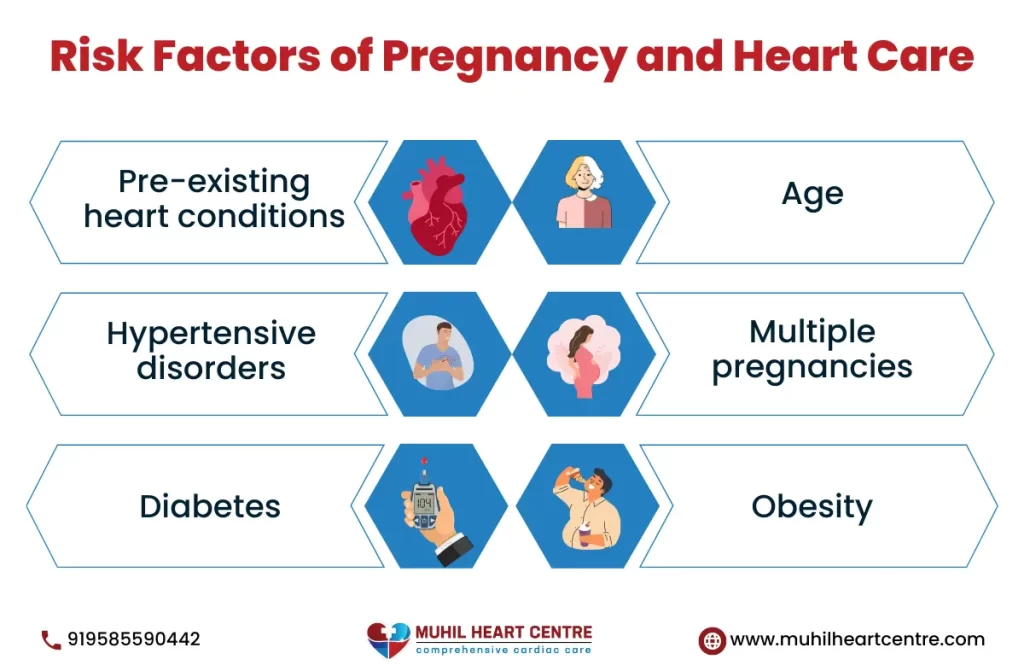Pregnancy is a remarkable and life-altering phase in a woman’s journey. It is essential to prioritize heart care during pregnancy as hormonal and physiological changes can impact cardiovascular health. During this period, it is crucial to prioritize pregnancy and heart care in Vellore, a city renowned for its advanced healthcare facilities and expertise in the field of maternal care.
Pregnancy places increased demands on the cardiovascular system to support the growing fetus. The heart must pump more blood and adapt to hormonal and physiological changes. Heart care during pregnancy is crucial to ensure the well-being of both the mother and the developing baby. It involves monitoring and managing pre-existing heart conditions, recognizing and addressing pregnancy-related heart conditions, and promoting overall cardiovascular health.
Common Cardiovascular Changes During Pregnancy
During pregnancy, several cardiovascular changes occur to meet the increased demands of the developing baby. Below are the changes that require pregnancy and heart care in Vellore include:
Increased Blood Volume
Blood volume increases significantly during pregnancy to supply oxygen and nutrients to the growing fetus. The expansion of blood volume can cause physiological anemia, dilution of red blood cells, and changes in blood viscosity.
Increased Cardiac Output
The heart pumps more blood per minute to meet the increased demands of pregnancy. Cardiac output increases by approximately 30-50% due to an increase in stroke volume and heart rate.

Elevated Heart Rate
The heart rate increases during pregnancy to accommodate the increased workload. Resting heart rate may increase by 10-20 beats per minute.
Lower Blood Pressure
Blood pressure tends to decrease during the first and second trimesters due to hormonal and vascular changes. However, it usually returns to pre-pregnancy levels or is slightly higher in the third trimester.
Structural Changes
The heart may undergo mild structural changes during pregnancy, including mild left ventricular hypertrophy and dilation of the heart chambers.
Pre-existing Heart Conditions and Pregnancy
Women with pre-existing heart conditions require special attention and management during pregnancy. Common pre-existing heart conditions that require pregnancy and heart care in Vellore include:
Congenital Heart Disease
Women born with heart defects may require careful monitoring and management during pregnancy. The severity of the heart defect and its impact on heart function determine the level of risk.
Rheumatic Heart Disease
Women with a history of rheumatic heart disease, resulting from rheumatic fever, may experience increased strain on the heart during pregnancy. Close observation and proper handling are essential requirements during this time.
Valvular Heart Disease
Significant valve abnormalities, such as severe stenosis or regurgitation, can impact pregnancy. Women with valvular heart disease may require evaluation and treatment before conception to optimize outcomes.
Arrhythmias
Women with arrhythmias, such as atrial fibrillation or supraventricular tachycardia, may require specific management strategies during pregnancy to maintain heart rhythm stability.
Cardiomyopathies
Dilated cardiomyopathy or hypertrophic cardiomyopathy can affect pregnancy outcomes. Close monitoring, medication adjustments, and consultation with a multidisciplinary team are essential for the well-being of both the mother and the baby.
The Importance of Pregnancy and Heart Care in Vellore
Pregnancy is a transformative period marked by numerous physiological changes, including those affecting the cardiovascular system. The importance of cardiovascular care during pregnancy cannot be overstated, as the well-being of both the mother and the developing fetus hinges on the optimal function of the heart.
- Physiological Changes in Pregnancy: Pregnancy induces significant changes in the cardiovascular system to accommodate the growing needs of the developing fetus.
- Pre-existing Cardiovascular Conditions: Women with pre-existing cardiovascular conditions, such as hypertension, valvular heart disease, or congenital heart disorders, require specialized care during pregnancy.
- Gestational Hypertension and Preeclampsia: Gestational hypertension and preeclampsia are conditions unique to pregnancy that can impact the cardiovascular system.
- Diabetes and Cardiovascular Health: Pregnant women with diabetes, whether pre-existing or gestational, are at an increased risk of cardiovascular complications.
Pregnancy-Related Heart Conditions
Pregnancy itself can lead to the development of heart conditions or exacerbate pre-existing conditions. These conditions, known as pregnancy-related heart conditions, include:
Gestational Hypertension
Gestational hypertension is characterized by high blood pressure that develops after 20 weeks of pregnancy. It can increase the risk of preeclampsia, a potentially serious condition that affects multiple organ systems.
Preeclampsia
Preeclampsia is a disorder characterized by high blood pressure and organ damage, usually involving the kidneys and liver. It can have serious consequences for both the baby and the mother.
Peripartum Cardiomyopathy
Peripartum cardiomyopathy is a rare condition characterized by the development of heart failure in the last month of pregnancy or in the months following delivery. Its exact cause is unknown and requires pregnancy and heart care in Vellore as it involves a combination of hormonal, immunological, and vascular factors.
Aortic Dissection
Aortic dissection, a potentially life-threatening condition involving a tear in the aorta, can occur during pregnancy, especially in women with underlying connective tissue disorders or aortic abnormalities.
Management and Treatment
Proper management and treatment are crucial to ensure the well-being of pregnant women with heart conditions. The pregnancy and heart care in Vellore may vary depending on the severity of the condition, the stage of pregnancy, and individual factors. Key aspects of management include:
Pre-pregnancy Evaluation
Women with pre-existing heart conditions should undergo a comprehensive evaluation before pregnancy. This evaluation includes a thorough assessment of heart function, identification of potential risks, and counseling regarding the risks and benefits of pregnancy.
Multidisciplinary Team
Women with heart conditions should receive care from a multidisciplinary team, including obstetricians, cardiologists, and other relevant specialists. Collaborative decision-making ensures optimal management and reduces potential risks.
Regular Monitoring
Regular monitoring of blood pressure, heart function, and fetal well-being is essential during pregnancy. This may involve frequent prenatal visits, echocardiograms, electrocardiograms, and fetal monitoring tests.
Medication Management
Medications may need to be adjusted or modified during pregnancy to ensure maternal stability while minimizing potential risks to the developing baby. Medication decisions should be made in consultation with healthcare providers experienced in managing cardiovascular conditions during pregnancy.
Lifestyle Modifications
Adopting a healthy lifestyle is vital during pregnancy to promote cardiovascular health. This includes maintaining a balanced diet, engaging in regular physical activity as advised by healthcare providers, avoiding tobacco and alcohol, and managing stress.
Delivery Planning
The mode and timing of delivery may need to be carefully planned based on the mother’s heart condition and the overall health of the baby. Vaginal delivery is possible in most cases, but in certain situations, a cesarean section may be recommended.
What Our Cardiologist Offers?
Cardiologists play a crucial role to provide pregnancy and heart care in Vellore, especially for women with heart conditions. This may include:
Preconception Counseling: Healthcare providers should offer comprehensive preconception counseling to women with heart conditions. This counseling involves assessing risks, optimizing heart function, and discussing family planning options.
Risk Assessment and Monitoring: Regular risk assessment and monitoring throughout pregnancy allow for early detection and management of potential complications. Healthcare providers should closely monitor blood pressure, heart function, and fetal well-being.
Collaborative Care: Collaboration between obstetricians, cardiologists, and other specialists is essential in managing pregnant women with heart conditions. Regular communication and shared decision-making ensure comprehensive and individualized care.
Patient Education: Healthcare providers should provide pregnant women with heart conditions with appropriate education and support. This includes explaining the risks, symptoms to watch for, and the importance of adhering to medication and lifestyle recommendations.
Postpartum Care: The postpartum period requires ongoing care and monitoring. Healthcare providers should ensure appropriate follow-up, including assessing heart function, addressing any postpartum complications, and providing guidance on contraception and future pregnancies.
Conclusion
To conclude, heart care during pregnancy is crucial to ensure the well-being of both the mother and the baby. Pre-existing heart conditions and pregnancy-related heart conditions require specialized management and close monitoring. Collaboration between cardiologists is essential, and careful evaluation and planning are necessary to optimize outcomes. With proper pregnancy and heart care in Vellore, women with heart conditions can have healthy pregnancies and deliver healthy babies.
Read also Pediatric Cardiology in Vellore.


